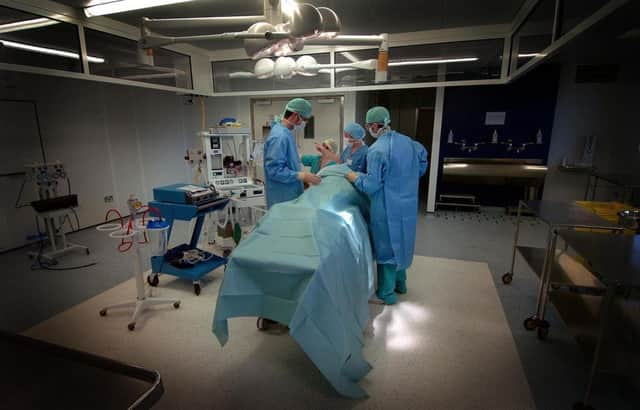NHS special report: '˜Impending disaster' of downgrading emergency units


Analysis of documents drawn up to remodel the health system show that across the country casualty units have been earmarked for downgrade despite record demand and serious overcrowding as the NHS goes through its worst winter crisis for decades.
In Yorkshire, not a single hospital trust met its national A&E four hour treatment targets in December and thousands of patients were forced to wait up to 12 hours for a hospital bed.
Advertisement
Hide AdAdvertisement
Hide AdNHS bosses insist that concentration of specialist urgent services could save lives and there are no plans for a “significant” reduction in emergency units.
But one senior emergency doctor told The Yorkshire Post that the plans propose to “make the River Nile run backwards” by planning for a reduction in demand for A&E services at a time when Britain has a growing and ageing population.
Advertisement
Hide AdAdvertisement
Hide AdDr Taj Hassan, Royal College of Emergency Medicine (RCEM) president, said that while the STPs had “admirable” ambitions they were in their present form “unworkable”.
He said: “Closure of any emergency department will naturally require more beds to be found elsewhere - patients do not just disappear when an option for care is removed.”
The STP has branded the health and social economy in the Scarborough area as ‘unsustainable both financially and clinically in its current form’, but the trust has rubbished claims that a new model with less consultants is a downgrade of A&E.
In Dewsbury, plans are under consideration to see its A&E downgraded to become a urgent care centre (UCC) by 2019, while consultant led emergency care is under consultation in Darlington. Huddersfield’s A&E is also being downgraded to a UCC, treating minor ailments.
Advertisement
Hide AdAdvertisement
Hide AdA key part of the STP scheme is to create specialised centres and reduce reliance on hospitals, in particular A&E units, by expanding primary care into integrated “hubs” staffed by GPs and other carers, bolstered by technology and teams to carry out home visits.
Already in Yorkshire, this style of care is being expanded in Rotherham, Hull, and East Riding.
But emergency medicine experts argue that the NHS lacks the additional beds and community care resources that would be required to cope with such a change. At a time when 12-hour trolley waits have doubled in the last two years, they accuse managers of basing the future of the health service on “hopes and rhetoric”.
Dr Chris Moulton, vice president of the RCEM, said: “A&E units are desperately short of capacity and the idea that you can close departments and people will stop being ill is the equivalent of proposing that the River Nile should flow backwards.”
Advertisement
Hide AdAdvertisement
Hide AdAn NHS England spokesperson said: “The number of people seeking urgent care is on the rise so overall we expect the range of services available to them to expand over coming years. Within that overall expansion, it may be possible to improve care and save lives with some concentration of specialist urgent services. This approach has increased the chances of surviving a major trauma in this country by 50 per cent. However we do not expect significant numbers of A&E changes in the years ahead,”